英语写作手册 unit3
初三下册英语人教版unit3作文

初三下册英语人教版unit3作文English:In Unit 3 of the third semester of junior high school English, we have learned a variety of topics, including hobbies, sports, and favorite activities. Through these topics, we have expanded our vocabulary and practiced using different sentence structures. Personally, I found the lessons on hobbies particularly interesting because it allowed me to talk about something I am passionate about. Moreover, discussing sports and favorite activities enabled me to connect with my classmates and learn about their interests. Overall, this unit has been engaging and has helped me improve my English skills significantly.中文翻译:在初中英语的第三学期第三单元中,我们学习了各种主题,包括爱好、体育运动和喜爱的活动等。
通过这些主题,我们扩展了我们的词汇量,并练习了使用不同的句子结构。
就我个人而言,我发现关于爱好的课程特别有趣,因为它让我能够谈论我热爱的事物。
此外,讨论体育运动和喜爱的活动让我能够与同学们建立联系,了解他们的兴趣。
总的来说,这个单元非常吸引人,并帮助我显著提高了我的英语水平。
英语写作手册第三章
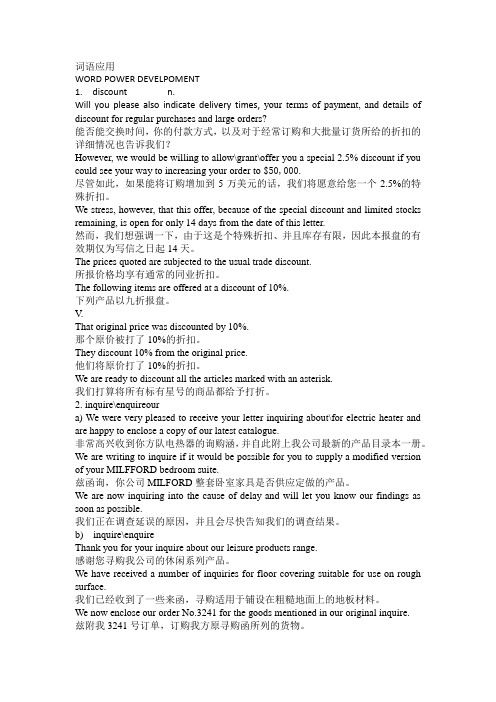
词语应用WORD POWER DEVELPOMENT1. discount n.Will you please also indicate delivery times, your terms of payment, and details of discount for regular purchases and large orders?能否能交换时间,你的付款方式,以及对于经常订购和大批量订货所给的折扣的详细情况也告诉我们?However, we would be willing to allow\grant\offer you a special 2.5% discount if you could see your way to increasing your order to $50,000.尽管如此,如果能将订购增加到5万美元的话,我们将愿意给您一个2.5%的特殊折扣。
We stress, however, that this offer, because of the special discount and limited stocks remaining, is open for only 14 days from the date of this letter.然而,我们想强调一下,由于这是个特殊折扣、并且库存有限,因此本报盘的有效期仅为写信之日起14天。
The prices quoted are subjected to the usual trade discount.所报价格均享有通常的同业折扣。
The following items are offered at a discount of 10%.下列产品以九折报盘。
V.That original price was discounted by 10%.那个原价被打了10%的折扣。
They discount 10% from the original price.他们将原价打了10%的折扣。
英语写作手册 unit3
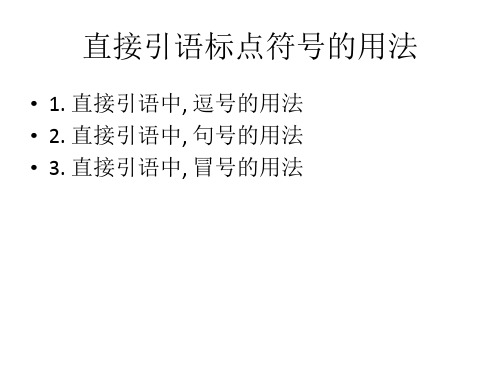
• 6. We will go there , if it is fine tomorrow.
• 状语从句可置于句首或句末。置于句首时, 一般要用标点隔开;而置于句末时,则无需与 主句隔开,故以上句子应改为: 6. If it is fine tomorrow , we will go there. 或 We will go there if it is fine tomorrow.
2. 说明语插在中间将直接引语分成 前后两部分
• 2.1 当直接引语的前一部分不能构成意思完整 的句子时, 说明语后用逗号, 如: • A. “ I haven’t been told,” he said, “ of the danger of skiing.: • B. “ For your next project,” said the teacher, “ you will write an essay about the Blarney Stone.” • 2.2 当直接引语的前一部分的结尾是一个句子 的末尾时, 说明语后用句号 直接引语的后一 部分的开头要大写, 如: • A. “ I can’t believe it!” he exclaimed. “our house can’t have been burned down!”
中国学生常见标点符号错误
• 1. While she is reading《Gone With the Wind》, I am cooking。 • 2. My sister bought a lot of fruits for me , such as banana 、orange 、apple and pear.
• 3. I thought to myself :“What kind of trap is she laying ?” • 4. He asked :“Where are you from ?”
英语书第三单元英语作文八年级
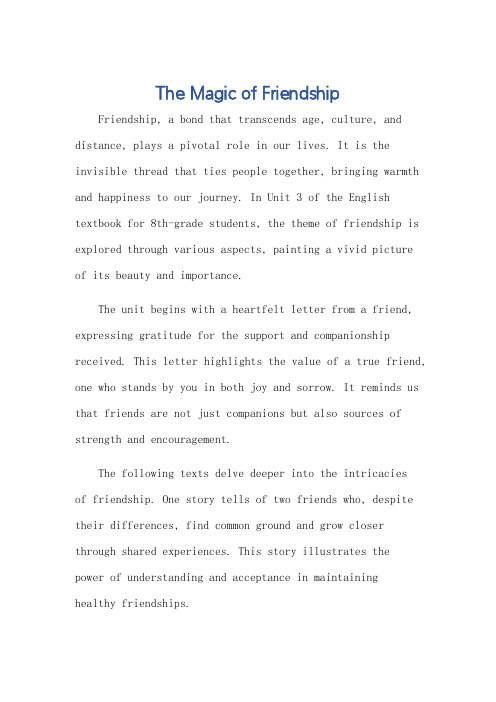
The Magic of FriendshipFriendship, a bond that transcends age, culture, and distance, plays a pivotal role in our lives. It is the invisible thread that ties people together, bringing warmth and happiness to our journey. In Unit 3 of the English textbook for 8th-grade students, the theme of friendship is explored through various aspects, painting a vivid pictureof its beauty and importance.The unit begins with a heartfelt letter from a friend, expressing gratitude for the support and companionship received. This letter highlights the value of a true friend, one who stands by you in both joy and sorrow. It reminds us that friends are not just companions but also sources of strength and encouragement.The following texts delve deeper into the intricaciesof friendship. One story tells of two friends who, despite their differences, find common ground and grow closer through shared experiences. This story illustrates thepower of understanding and acceptance in maintaininghealthy friendships.Another passage discusses the importance of trust in friendships. It emphasizes that trust is built over time through honest communication and reliable behavior. Without trust, friendships can easily crumble, making it essentialto nurture this vital component.The unit concludes with a thought-provoking quote that summarizes the essence of friendship: "A friend is someone who knows all about you and still loves you." This quote resonates deeply, reminding us that true friends are those who accept us unconditionally, despite our flaws and imperfections.友谊的魔力友谊,一种超越年龄、文化和距离的纽带,在我们的生活中扮演着至关重要的角色。
英文第三单元作文
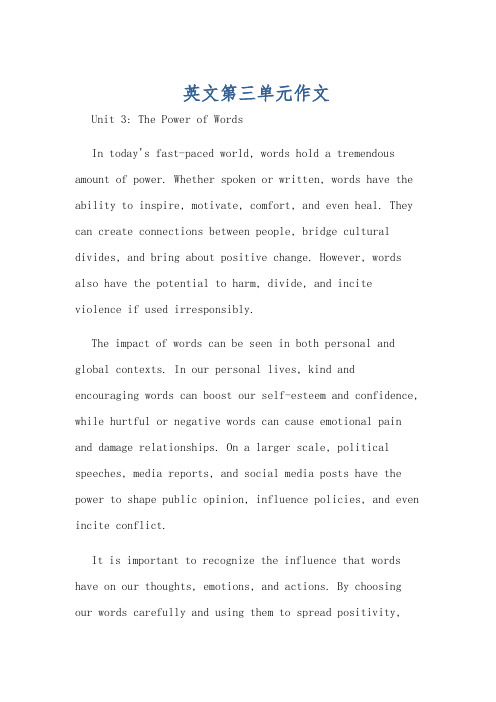
英文第三单元作文Unit 3: The Power of WordsIn today's fast-paced world, words hold a tremendous amount of power. Whether spoken or written, words have the ability to inspire, motivate, comfort, and even heal. They can create connections between people, bridge cultural divides, and bring about positive change. However, words also have the potential to harm, divide, and incite violence if used irresponsibly.The impact of words can be seen in both personal and global contexts. In our personal lives, kind and encouraging words can boost our self-esteem and confidence, while hurtful or negative words can cause emotional pain and damage relationships. On a larger scale, political speeches, media reports, and social media posts have the power to shape public opinion, influence policies, and even incite conflict.It is important to recognize the influence that words have on our thoughts, emotions, and actions. By choosing our words carefully and using them to spread positivity,understanding, and empathy, we can create a more harmonious and compassionate society. Conversely, by being mindful of the impact of our words, we can avoid causing harm and perpetuating negativity.Words have the power to bring people together or tear them apart. It is up to each of us to wield this power responsibly and with intention. By using words to upliftand empower others, we can contribute to a more peacefuland inclusive world.第三单元:言语的力量在今天快节奏的世界中,言语拥有巨大的力量。
英语书第3单元作文
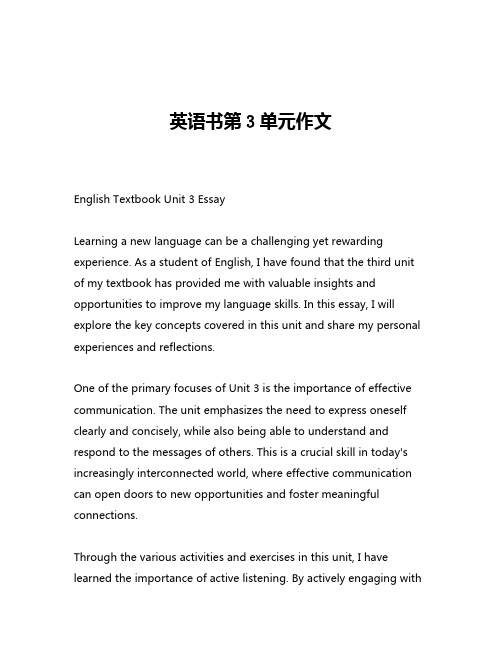
英语书第3单元作文English Textbook Unit 3 EssayLearning a new language can be a challenging yet rewarding experience. As a student of English, I have found that the third unit of my textbook has provided me with valuable insights and opportunities to improve my language skills. In this essay, I will explore the key concepts covered in this unit and share my personal experiences and reflections.One of the primary focuses of Unit 3 is the importance of effective communication. The unit emphasizes the need to express oneself clearly and concisely, while also being able to understand and respond to the messages of others. This is a crucial skill in today's increasingly interconnected world, where effective communication can open doors to new opportunities and foster meaningful connections.Through the various activities and exercises in this unit, I have learned the importance of active listening. By actively engaging withthe speaker and focusing on their words, tone, and body language, I have found that I can better comprehend the intended message and formulate appropriate responses. This skill has been particularly useful in group discussions and presentations, where I have had the chance to practice my communication abilities.Moreover, Unit 3 delves into the nuances of language, exploring the different styles and registers that can be employed in various contexts. From formal academic writing to casual conversational exchanges, the unit has equipped me with the knowledge and tools to adapt my language use to suit the situation at hand. This understanding has been invaluable in my academic and professional endeavors, where I often need to navigate different communication environments.Another key aspect of this unit is the emphasis on cultural awareness and sensitivity. As English is a global language, it is essential to recognize and respect the diverse cultural backgrounds and perspectives of those with whom we communicate. The unit has encouraged me to approach language learning with an open and curious mindset, seeking to understand and appreciate the cultural influences that shape the way people express themselves.Through the study of cultural differences and their impact on communication, I have gained a deeper appreciation for the richnessand complexity of the English language. I have learned to be mindful of potential misunderstandings or miscommunications that can arise due to cultural differences, and to approach such situations with empathy and a willingness to learn.Furthermore, Unit 3 has emphasized the importance of developing a strong vocabulary. The unit has provided me with various strategies and techniques for expanding my word knowledge, such as contextual clues, word roots and affixes, and the use of dictionaries and thesauruses. By consistently applying these strategies, I have noticed a significant improvement in my ability to comprehend and articulate my thoughts more effectively.One particular exercise that I found particularly useful was the practice of creating word maps. By visually organizing related words and their associations, I was able to better understand the nuances and subtle differences between similar terms. This, in turn, has enhanced my ability to choose the most appropriate words to convey my intended meaning.In addition to the focus on communication and language skills, Unit 3 has also addressed the importance of critical thinking and problem-solving. The unit has presented various scenarios and case studies that require students to analyze information, evaluate different perspectives, and formulate well-reasoned solutions. Thishas been a valuable exercise in developing my critical thinking abilities, which are essential not only in language learning but in all areas of academic and professional life.Through the engaging discussions and collaborative activities in this unit, I have had the opportunity to practice my critical thinking skills and learn from the insights and perspectives of my classmates. This exchange of ideas has broadened my understanding of the complexities involved in effective communication and problem-solving.Overall, my experience with Unit 3 of the English textbook has been both challenging and rewarding. The unit has provided me with a deeper understanding of the nuances of language, the importance of cultural awareness, and the critical thinking skills necessary for effective communication. As I continue my journey in learning English, I am confident that the knowledge and skills gained from this unit will serve me well in my academic, professional, and personal endeavors.In conclusion, the third unit of the English textbook has been a valuable and transformative experience for me. By delving into the complexities of language, communication, and cultural awareness, I have developed a more comprehensive understanding of the English language and its role in our global society. I am grateful for theopportunity to have engaged with this unit and am excited to apply the lessons learned to my ongoing language learning and personal growth.。
七下英语练习册第三单元作文
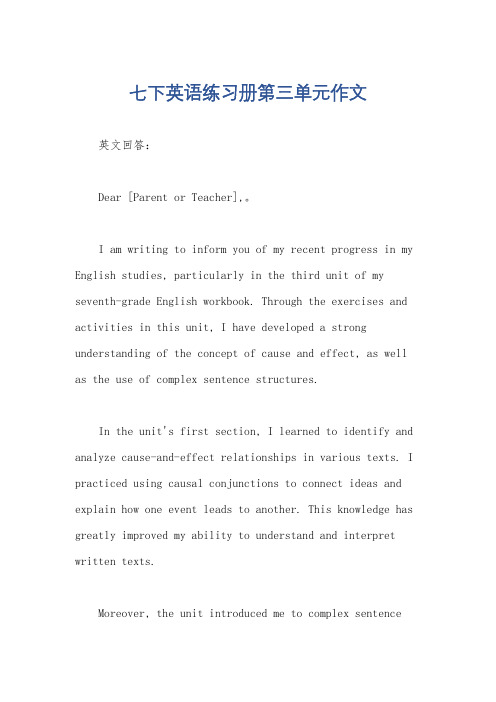
七下英语练习册第三单元作文英文回答:Dear [Parent or Teacher],。
I am writing to inform you of my recent progress in my English studies, particularly in the third unit of my seventh-grade English workbook. Through the exercises and activities in this unit, I have developed a strong understanding of the concept of cause and effect, as well as the use of complex sentence structures.In the unit's first section, I learned to identify and analyze cause-and-effect relationships in various texts. I practiced using causal conjunctions to connect ideas and explain how one event leads to another. This knowledge has greatly improved my ability to understand and interpret written texts.Moreover, the unit introduced me to complex sentencestructures, such as compound and complex sentences. I studied the rules for using coordinating and subordinating conjunctions to combine multiple clauses into a single coherent sentence. These skills have significantly enhanced my writing abilities, allowing me to express myself more clearly and concisely.To demonstrate my grasp of these concepts, I have been actively participating in class discussions and completing all assignments with precision. I am confident that I have made substantial progress in my English studies and am eager to continue improving my abilities.Thank you for your continued support and encouragement.Sincerely,。
英语写作手册 PART THREE 参考答案
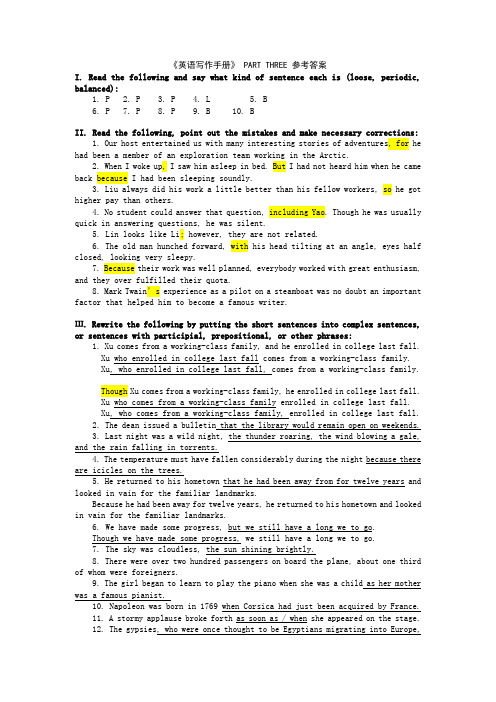
《英语写作手册》 PART THREE 参考答案I. Read the following and say what kind of sentence each is (loose, periodic, balanced):1. P2. P3. P4. L5. B6. P7. P8. P9. B 10. BII. Read the following, point out the mistakes and make necessary corrections:1. Our host entertained us with many interesting stories of adventures, for he had been a member of an exploration team working in the Arctic.2. When I woke up, I saw him asleep in bed. But I had not heard him when he came back because I had been sleeping soundly.3. Liu always did his work a little better than his fellow workers, so he got higher pay than others.4. No student could answer that question, including Yao. Though he was usually quick in answering questions, he was silent.5. Lin looks like Li; however, they are not related.6. The old man hunched forward, with his head tilting at an angle, eyes half closed, looking very sleepy.7. Because their work was well planned, everybody worked with great enthusiasm, and they over fulfilled their quota.8. Mark Twain’s experience as a pilot on a steamboat was no doubt an important factor that helped him to become a famous writer.Ш. Rewrite the following by putting the short sentences into complex sentences, or sentences with participial, prepositional, or other phrases:1. Xu comes from a working-class family, and he enrolled in college last fall.Xu who enrolled in college last fall comes from a working-class family.Xu, who enrolled in college last fall, comes from a working-class family.Though Xu comes from a working-class family, he enrolled in college last fall.Xu who comes from a working-class family enrolled in college last fall.Xu, who comes from a working-class family, enrolled in college last fall.2. The dean issued a bulletin that the library would remain open on weekends.3. Last night was a wild night, the thunder roaring, the wind blowing a gale, and the rain falling in torrents.4. The temperature must have fallen considerably during the night because there are icicles on the trees.5. He returned to his hometown that he had been away from for twelve years and looked in vain for the familiar landmarks.Because he had been away for twelve years, he returned to his hometown and looked in vain for the familiar landmarks.6. We have made some progress, but we still have a long we to go.Though we have made some progress, we still have a long we to go.7. The sky was cloudless, the sun shining brightly.8. There were over two hundred passengers on board the plane, about one third of whom were foreigners.9. The girl began to learn to play the piano when she was a child as her mother was a famous pianist.10. Napoleon was born in 1769 when Corsica had just been acquired by France.11. A stormy applause broke forth as soon as / when she appeared on the stage.12. The gypsies, who were once thought to be Egyptians migrating into Europe,are really a nomadic people from India.13. Because the new workers are young and inexperienced, they are eager to learn from the veteran workers.14. It was a poor quarter with a lot of small huts, dotting a hillside with mud walls and straw roofs.15. Hearing that his father was ill, he was anxious to go home to see him, so he went to the station early in the morning to buy a ticket.2.To omit unnecessary elements3.To connect related words/ parts properly1. She began to speak at the meeting at ten o’clock.2. Bernard Shaw was one of the best-known playwrights in the world.3. The houses were mere shanties with rags stuffed in the cracks and holes.4. The novel I read on the train didn’t interest me at all.5. The well-dressed man who admitted us to the house was later learned to bea thief.6. I lost some important documents. With the help of the police, I found them three days later.7. When we entered the shop, a saleswoman greeted us. We saw all kinds of shores on the shelves. Because the prices were quite reasonable, a lot of customers were buying them.8. Tell Helen I will come to see her if she is at home.9. Listening attentively, I heard a faulty sound.10. On entering the room, I saw no one.11. Fred is so energetic and capable that you can rely on him.12. The children promised to be careful and return home early.13. Dickens’s novels offer no solution to the social injustices that he exposes.Dickens offers no solution to the social injustices that he exposes in novels.14. Either my watch is fast, or yours is slow.15. Glancing out of the window, I was attracted by a beautiful view.16. He finished reading ten books during the vacation.17. If interested in painting, you can take a course at the evening school.18. She said that she would come if she could. She also told us not to wait for her if she didn’t come.19. I told my friend the good news at once after I posted the letter.I told my friend the good news that the letter was posted at once.20. I like his poems, so I will go to his lecture.I will go to the lecture because/if I like his poems.V. Revise the following sentences. Try to make them concise.Ways to achieve conciseness1.Avoiding repetition2.Deleting unrelated / unnecessary words or phrases3.Changing the sentence structure1. In 1840, the Opium War broke out.2. There are more books in their library than in ours.3. He returned home after he graduated from college.4. We planned to meet just before sunrise.5. The flood was due to the heavy rain in late spring.6. He was asked to repeat the sentence.7. I play badminton as well as my brother.8. It seemed to his friends that his attitude was puzzling.9. These watermelons are large and sweet.10. He did not tell the truth.11. A number of students want to join the drama club.12. He was kind enough to let me share the umbrella.13. Zhao was elected the representative of the class by the whole class.14. At present I am taking the course of World History and a course in geography.15. The plane circled the airport for about ten minutes and then disappeared.16. In my opinion, he has not done his work very well.17. I would like you to consider whether or not you will publish your recent article on women scientists in China.18. Because he had missed many lectures, he was aware that he would fail the exam.19. You must first work out an outline for your paper, and then collect all kinds of materials to support your point of view.20. In that country violent death has become a commonplace thing.21. He is not only a good pianist but also a good singer.22. This pretty actress keeps appearing in TV serials.This pretty actress appears in TV serials repeatedly.23. As a rule, students are not allowed to take books out of this reading-room.24. According to the speaker, it is obvious that the responsibility system has helped to increase production.25. One reason why people are well informed in this country is that many newspapers can easily be bought or subscribed to.26. Statistics show that from 1980-1990 enrollments at this school doubled.27. There are so many inexperienced workers that production of the factory has been affected.28. About 50 patients in this ward are being given acupuncture treatment.29. His name is James Williams.30. Whatever he does, he works with great care.VI. Rewrite the following sentences, emphasizing the man idea in each.Ways to achieve emphasis:1.Inversion2.Negative-positive statements3.Placing: beginning/ end4.Repetition5.Subordination6.Emphatic words / phrases / sentences7.Alliteration1. Huang is over two meters tall, and he is the tallest man of the team.2. After he went bankrupt, he lost interest in social position, reputation, life itself, and even friends.3. He decided to take the job, which was something unexpected.4. Under no circumstances will China be the first to use nuclear weapons.5. Yang alone can do the work, though there are twenty students in the class.6. As a result of reform and the open policy, China has changed a great deal during the past 14 years.7. According to newspaper reports, she was the first Chinese woman who had wona gold medal for figure skating in an international contest.8. Robert attempted to do all the things that the sailor member of the crew usually did while serving as a cabin boy on the ship.9. Among his neighbors was Mrs. Jones, the famous writer.10. With the teacher’s patient help, the students mad good progress.11. She often helps her class to improve their pronunciation.12. Though there are few mistakes in the language of the composition, it is not very good because the content is not interesting.VII. Rewrite the following passage, giving the sentences some variety in length and structure.Ways to achieve variety1.To use short sentences between long ones2.To use simple sentences between compound and complex ones3.To use periodic sentences between loose ones4.To use occasional question, command, or exclamation among statements(Omitted.)。
- 1、下载文档前请自行甄别文档内容的完整性,平台不提供额外的编辑、内容补充、找答案等附加服务。
- 2、"仅部分预览"的文档,不可在线预览部分如存在完整性等问题,可反馈申请退款(可完整预览的文档不适用该条件!)。
- 3、如文档侵犯您的权益,请联系客服反馈,我们会尽快为您处理(人工客服工作时间:9:00-18:30)。
• 3. I thought to myself , “What kind of trap is she laying ?” • 4. He asked , “Where are you from ?”
• 5. Good manners can be seen in everyday life. For example , a person with good manners is kind and helpful to others.
3. 当说明语在整个直接引语之后
• 当说明语在整个直接引语之后时,直接引 语句子的结尾用逗号,不用句号。如果直 接引语句子的结尾时句号或者是感叹号, 则不用逗号。 • a. “No body tells me anything,” said Mrs. Walsh. • b. “Is it time to eat? ” She said. • c. “Oder, please!” shouted the chairman.
• 英文中的印刷体用斜体字表示书籍、报刊、戏剧、电影、 绘画作品等的名称;英文常用逗号来代替顿号;而句号是用 实心小黑点表示。故以上两句应改为: 〔修改〕 1. While she is reading Gone With the Wind , I am cooking. (书 写体) 〔修改〕 2. My sister bought a lot of fruits for me , such as banana , orange , apple and pear.
直接引语标点符号的用法
• 1. 直接引语中, 逗号的用法 • 2. 直接引语中, 句号的用法 • 3. 直接引语中, 冒号的用法
1. 说明语在整个直接引语之前
1.1 直接引语只是一个词是,说明语后可不用 标点符号,直接引语也可不用引号,如: • A. she cried out “What!” and ran for the bus. • B. What will you do if she says No? 1.2 直接引语是一个不长的句子时, 说明语后 多用逗号,如: • A. He said, “I have found the key.” • B. He said, “I think you and I should be frie成 前后两部分
• 2.1 当直接引语的前一部分不能构成意思完整 的句子时, 说明语后用逗号, 如: • A. “ I haven’t been told,” he said, “ of the danger of skiing.: • B. “ For your next project,” said the teacher, “ you will write an essay about the Blarney Stone.” • 2.2 当直接引语的前一部分的结尾是一个句子 的末尾时, 说明语后用句号 直接引语的后一 部分的开头要大写, 如: • A. “ I can’t believe it!” he exclaimed. “our house can’t have been burned down!”
• 7. Glancing through the essay entitled “Why Not More ?”, Dr. Jefferson frowned thoughtfully.
• 7. Glancing through the essay entitled “Why Not More ?,” Dr. Jefferson frowned thoughtfully. • 许多学生对诸如上例引号边的标点位置含糊, 不清楚以下常用法:句号和逗号必须置于引号 之内;冒号和分号必须置于引号之外;如果所引 内容本身是疑问句或感叹句,问号和感叹号一 般放在引号之内,否则,问号和感叹号则放在引 号之外。
• 6. We will go there , if it is fine tomorrow.
• 状语从句可置于句首或句末。置于句首时, 一般要用标点隔开;而置于句末时,则无需与 主句隔开,故以上句子应改为: 6. If it is fine tomorrow , we will go there. 或 We will go there if it is fine tomorrow.
中国学生常见标点符号错误
• 1. While she is reading《Gone With the Wind》, I am cooking。 • 2. My sister bought a lot of fruits for me , such as banana 、orange 、apple and pear.
练习
• “Is your cab available?” I asked when he finally looked up at me. He nodded, then said apologetically as I settled into the back seat, “I‟m sorry, but I was reading a letter.” He sounded as if he had a cold or something. “I‟m in no hurry,” I told him. “Go ahead and finish your letter.” He shook his head. “I‟ve read it several times already. I guess I almost know it by heart.” “Letters from home always mean a lot,” I said. “At least they do with me because I‟m on the road so much.” Then, estimating that he was 60 or 70 years old, I guessed,“From a child or maybe a grandchild?” “This isn‟t family,” he replied. “Although,” he went on, “come to think of it, it might just as well have been family. Old Ed was my oldest friend. In fact, we used to call each other „Old Friend‟ — when we‟d meet, that is. I‟m not much of a hand at writing.”
• 3. I thought to myself :“What kind of trap is she laying ?” • 4. He asked :“Where are you from ?”
• 5. Good manners can be seen in everyday life. For example : a person with good manners is kind and helpful to others.
练习
• “Is your cab available?” I asked when he finally looked up at me. He nodded, then said apologetically as I settled into the back seat, “I‟m sorry, but I was reading a letter.” He sounded as if he had a cold or something. “I‟m in no hurry,” I told him. “Go ahead and finish your letter.” He shook his head. “I‟ve read it several times already. I guess I almost know it by heart.” “Letters from home always mean a lot,” I said. “At least they do with me because I‟m on the road so much.” Then, estimating that he was 60 or 70 years old, I guessed,“From a child or maybe a grandchild?” “This isn‟t family,” he replied. “Although,” he went on, “come to think of it, it might just as well have been family. Old Ed was my oldest friend. In fact, we used to call each other „Old Friend‟ — when we‟d meet, that is. I‟m not much of a hand at writing.”
